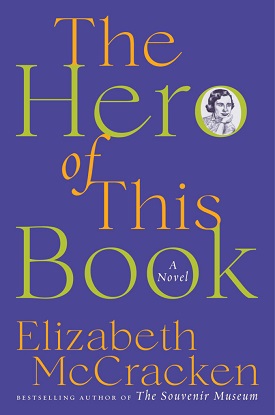 Synopsis:
Synopsis:
Ten months after her mother’s death, the unnamed narrator of The Hero of This Book, a writer, travels to London. It was one of her mother’s favorite cities, as well as a place they spent time together. As the narrator wanders the streets, she reflects on her mother’s life, their travels and relationship. Thoughts of the past meld with contemplation about the future. Back in New England, the family home is listed for sale, its considerable contents already winnowed and the remains offered up to the public in an estate sale.
The narrator recalls all that made her complicated mother extraordinary — her brilliant wit, her generosity, her unbelievable obstinacy, her indomitable will, and the way she seized life despite physical difficulties — and ponders how her mother endured. Even though she respects her mother’s nearly pathological sense of privacy, she must come to terms with whether chronicling her remarkable mother’s life constitutes an act of love . . . or betrayal.
The Hero of This Book examines grief and renewal, and the relationship between a child and her parents. What begins as a question of filial devotion evolves into contemplation about what it means to write. Author Elizabeth McCracken tenderly and lovingly demonstrates that art is what remains when all else falls away.
Review:

Author Elizabeth McCracken has published seven previous books, including Niagara Falls All Over Again; An Exact Replica of a Figment of My Imagination, her memoir about the death of a child before birth; and collections of short stories entitled Thunderstruck & Other Stories and The Souvenir Museum. She earned Bachelors and Master’s degrees in English from Boston University, a Masters in Fine Arts from the University of Iowa, and Master’s of Science in Library Science from Drexel University. She holds the James Michener Chair of Fiction of the Michener Center for Writers at the University of Texas at Austin and serves as author Anne Patchett’s editor. She is married to novelist and playwright Edward Carey, with whom she shares a son and daughter.
Is The Hero of This Book a work of fiction, a memoir, or a treatise on writing? It doesn’t matter because it is an engaging, heartfelt tribute to a mother from the daughter who loved, admired, and was bemused by her. McCracken’s narrator considers various literary styles, insisting she is not a memoirist, and is not even sure about the difference between fiction and memoir. “Permission to lie; permission to cast aside worries about plausibility.” To her “emotionally autobiographical” fiction, the narrator has lent her secrets, but never her identity, out of fear of being found. Now she claims to have perhaps lost her inhibitions. Or not. (She equivocates about various topics throughout the narrative.) Her mother hated graves and therapy, and viewed memoirs with contempt, especially those replete with complaints about parents. But was fun-loving, adventurous, and “loved to tell stories about herself.”
The fictional narrator remains anonymous throughout the book, but acknowledges that the “actual me is the author.” She describes how she wandered the streets of London during a return visit in August 2019, “the summer before the world stopped,” feeling every bit the motherless child she became ten months earlier when her mother died. Yet she neither grieved nor mourned the mother whose name she also conceals until late in the story. She rejects the words “grief” and “mourning,” finding both terms “melodramatic. . . . I just missed her. I hated to see her go.” Back in Boston, her parents’ belongings had been sold during an estate sale, and their house was being readied to be put on the market. “In London, I found I wanted to hoard my little portion of her” — perhaps in the same way that her parents hoarded objects, although the narrator never uses that word in relationship to their living conditions or the monumental task of hauling their amassed belongings out of the house. Those belongings were curated to serve as “a bulwark to keep people away and out.” Rather, the trip was a means of escaping those mundane details of finalizing her mother’s affairs. The house — and, more specifically, the squalor in which her parents needlessly lived — had haunted her for years. “At first the house was untidy, then messy, then dirty, then a shame, a shanda, then squalid. Actual squalor. . . . [I]t really was shameful, to be so educated, with such resources, and live in squalor.” She was happy to be away from it all and soon, hopefully, unburdened by it. “I was bereaved and haunted,” she recalls.
As the narrator details walking around London, remembering her mother and the extraordinary life she lived, McCracken often employs a stream of consciousness style, permitting the narrator to veer off on tangents while relating a story. The technique makes the tale believable and authentic. Anyone who has experienced the grief of losing a loved one will recognize aspects of their own experience in the narrator’s recollections of family members and events, and her efforts to come to terms with who her parents were and their legacy. Ordinary objects, words, prictures or specific locations can trigger memories that flood one’s consciousness in jagged, disjointed, seemingly random order, as they do the narrator’s.
We’re not souls, we’re not our bodies; we’re the shimmering border between.
The narrator marvels at many aspects of her mother’s life and personality, as well as her physical characteristics. She remembers her mother saying she sustained a “birth injury” or “forceps injury,” but never a birth defect, and describes her mother’s refusal to let her body inhibit her lifestyle or accomplishments. She was formidable and personable, unique and memorable, and it is not until well into the story that the narrator names her mother’s condition – words she never heard her mother utter until she was fifty-eight years old and the narrator was twenty-six. Of course, to the narrator her “mother’s body was just her body,” and it surprised her when others noticed and/or commented about it, in part because of her mother’s personality. It was also just her body to her mother – never “something to overcome or accept any more than yours was.”
In some respects, her mother’s death came as a surprise. After all her mother had overcome and accomplished in her life, the narrator “was awaiting another resurrection.” When she had to accept that her mother would not survive, she and her brother had to make decisions about her mother’s last days and care. And they chose well, observing that both of her parents had “good deaths . . . from this angle especially, a quiet death in old age, people you love nearby: It feels like luck.” If the definition of being lucky includes being survived by a child who remembers the years spent with you lovingly, even in recognition of your flaws and missteps, the narrator’s parents were indeed lucky. She “hated to see them go” and, through the process of losing and missing them, illustrates the various ways in which she knew and understood her parents, while acknowledging that there was much about them, their lives, and their relationship she did not know. And will likely never know. It’s another aspect of the narrator’s feelings with which readers who have lost parents will identify. In her grief, the narrator realizes that she “only knew the stories my mother liked to tell, not the ones she’d prefer to forget,” which is, perhaps, a universal parental trait.
The Hero of This Book is an often hilarious and at times heartbreaking, beautifully crafted homage from an empathetic, bereaved daughter to her deceased mother (and, to a lesser degree, father, grandmother, and aunt). Thanks to McCracken’s vivid and evocative prose, the narrator’s parents and other family members spring back to life on the pages as McCracken details lives well-lived, along with personality quirks and eccentricities, and foibles. Her mother was ferociously private. The narrator wonders how her mother would react to the book, and ponders whether privacy outlives us. Ultimately, as with other weighty issues, she decides not to decide. Because concluding that the dead have no privacy might simply be a way to camouflage and justify her own self-centeredness. Besides, the narrator continues to keep many things secret and the book is her story — a story she needs to tell — even if her mother is the hero of it. And make no mistake: the narrator’s brilliant, intellectual, stubborn, complicated, and unconventional mother is the undisputed hero of the book . . . and her daughter’s life.
The narrator’s ruminations never hit a false or contrived note, revealing her particular worldview and sometimes cheeky philosophies about writing. “I hate novels with unnamed narrators. I didn’t mean to write one. Write enough books and these things will happen. I never meant to write a novel about a writer, either.” She believes that life is all about story: “Your family is the first novel that you know.” Adult readers who are, like the narrator, motherless or orphaned children, may find themselves fondly recalling and missing their own parents as they get to know McCracken’s perhaps fictional ones. I certainly did.



Comments are closed.